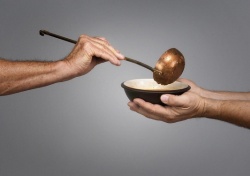Difference between revisions of "Selfishness"
m (Text replacement - "pride" to "{{Wiki|pride}}") |
|||
| Line 2: | Line 2: | ||
<poem> | <poem> | ||
'''[[Selfishness]]''' is placing [[concern]] with oneself or one's own interests above the well-being or interests of others. | '''[[Selfishness]]''' is placing [[concern]] with oneself or one's own interests above the well-being or interests of others. | ||
| − | Selfishness is the opposite of [[altruism]] or [[selflessness]]; and has also been contrasted (as by C. S. Lewis) with self-centredness | + | [[Selfishness]] is the opposite of [[altruism]] or [[selflessness]]; and has also been contrasted (as by C. S. Lewis) with self-centredness |
| − | Divergent views | + | Divergent [[views]] |
The implications of [[selfishness]] have inspired divergent [[views]] within [[religious]], [[philosophical]], [[psychological]], economic and evolutionary contexts. | The implications of [[selfishness]] have inspired divergent [[views]] within [[religious]], [[philosophical]], [[psychological]], economic and evolutionary contexts. | ||
Classical | Classical | ||
| − | Aristotle joined what he saw as the majority of his countrymen in condemning for [[selfishness]] those who sought only to profit themselves; but approved the self-love of the man of [[reason]] who sought to gain for himself the greatest share of what deserved {{Wiki|social}} praise. | + | {{Wiki|Aristotle}} joined what he saw as the majority of his countrymen in condemning for [[selfishness]] those who sought only to profit themselves; but approved the [[self-love]] of the man of [[reason]] who sought to gain for himself the greatest share of what deserved {{Wiki|social}} praise. |
| − | Seneca proposed a cultivation of the [[self]] within a wider community - a care for the [[self]] which he opposed to mere [[selfishness]] in a theme that would later be taken up by Foucault. | + | Seneca proposed a [[cultivation]] of the [[self]] within a wider {{Wiki|community}} - a care for the [[self]] which he opposed to mere [[selfishness]] in a theme that would later be taken up by {{Wiki|Foucault}}. |
Medieval/Renaissance | Medieval/Renaissance | ||
[[File:DSC 11431.jpg|thumb|250px|]] | [[File:DSC 11431.jpg|thumb|250px|]] | ||
| − | Selfishness was viewed in the Western {{Wiki|Christian}} [[tradition]] as a central vice – as [[standing]] at the [[roots]] of the Seven deadly [[sins]] in the [[form]] of {{Wiki|pride}}. | + | [[Selfishness]] was viewed in the {{Wiki|Western}} {{Wiki|Christian}} [[tradition]] as a central vice – as [[standing]] at the [[roots]] of the Seven deadly [[sins]] in the [[form]] of {{Wiki|pride}}. |
| − | Francis Bacon carried forward this [[tradition]] when he characterised “[[Wisdom]] for a man's [[self]].. s the [[wisdom]] of rats”. | + | {{Wiki|Francis Bacon}} carried forward this [[tradition]] when he characterised “[[Wisdom]] for a man's [[self]].. s the [[wisdom]] of rats”. |
Modernity | Modernity | ||
With the [[emergence]] of a commercial {{Wiki|society}}, Bernard Mandeville proposed the [[paradox]] that {{Wiki|social}} and economic advance depended on private vices – on what he called the sordidness of [[selfishness]]. | With the [[emergence]] of a commercial {{Wiki|society}}, Bernard Mandeville proposed the [[paradox]] that {{Wiki|social}} and economic advance depended on private vices – on what he called the sordidness of [[selfishness]]. | ||
| − | Adam Smith with the {{Wiki|concept}} of the invisible hand saw the economic system as usefully channelling [[selfish]] self-interest to wider ends; while Locke based {{Wiki|society}} upon the {{Wiki|solitary}} {{Wiki|individual}}, arguably opening the door for later thinkers like Ayn Rand to argue for [[selfishness]] as a {{Wiki|social}} [[virtue]] and the [[root]] of {{Wiki|social}} progress. | + | Adam Smith with the {{Wiki|concept}} of the {{Wiki|invisible}} hand saw the economic system as usefully channelling [[selfish]] self-interest to wider ends; while Locke based {{Wiki|society}} upon the {{Wiki|solitary}} {{Wiki|individual}}, arguably opening the door for later thinkers like Ayn Rand to argue for [[selfishness]] as a {{Wiki|social}} [[virtue]] and the [[root]] of {{Wiki|social}} progress. |
| − | Roman {{Wiki|Catholic}} [[philosopher]] Jacques Maritain opposed the latter [[view]] by way of the {{Wiki|Aristotelian}} argument that framing the fundamental question of politics as a choice between [[altruism]] and [[selfishness]] is a basic and harmful mistake of {{Wiki|modern}} states. Rather, cooperation ought to be the norm: [[human beings]] are by nature {{Wiki|social}} [[animals]], and so {{Wiki|individual}} persons can only find their full good in and through pursuing the good of the community. | + | {{Wiki|Roman}} {{Wiki|Catholic}} [[philosopher]] Jacques Maritain opposed the [[latter]] [[view]] by way of the {{Wiki|Aristotelian}} argument that framing the fundamental question of {{Wiki|politics}} as a choice between [[altruism]] and [[selfishness]] is a basic and harmful mistake of {{Wiki|modern}} states. Rather, cooperation ought to be the norm: [[human beings]] are by [[nature]] {{Wiki|social}} [[animals]], and so {{Wiki|individual}} persons can only find their full good in and through pursuing the good of the {{Wiki|community}}. |
| − | Psychology | + | {{Wiki|Psychology}} |
| − | Lack of {{Wiki|empathy}} has been seen as one of the [[roots]] of [[selfishness]], extending as far as the cold manipulation of the psychopath. | + | Lack of {{Wiki|empathy}} has been seen as one of the [[roots]] of [[selfishness]], extending as far as the cold manipulation of the {{Wiki|psychopath}}. |
The contrast between self-affirmation and [[selfishness]] has become a conflictual arena in which the respective claims of individual/community is often played out – between [[parents]] and children or men and women, for example. | The contrast between self-affirmation and [[selfishness]] has become a conflictual arena in which the respective claims of individual/community is often played out – between [[parents]] and children or men and women, for example. | ||
| − | Psychoanalysts favor the development of a genuine [[sense]] of [[self]], and may even speak of a healthy [[selfishness]], as opposed to the self-occlusion of what [[Anna]] {{Wiki|Freud}} called '[[emotional]] surrender'. | + | {{Wiki|Psychoanalysts}} favor the [[development]] of a genuine [[sense]] of [[self]], and may even speak of a healthy [[selfishness]], as opposed to the self-occlusion of what [[Anna]] {{Wiki|Freud}} called '[[emotional]] surrender'. |
| − | Game theory | + | Game {{Wiki|theory}} |
| − | Main article: game theory | + | Main article: game {{Wiki|theory}} |
| − | Given two actors, oneself and someone else, there are four types of possible {{Wiki|behavior}} directly impacting the welfare of the actors: [[selfishness]], [[altruism]], [[spite]], and cooperation. [[Selfishness]] is harming someone else in [[order]] to help oneself; [[altruism]] is harming oneself in [[order]] to help someone else; [[spite]] is harming oneself in [[order]] to harm someone else; cooperation is helping someone else and also helping oneself. | + | Given two actors, oneself and someone else, there are four types of possible {{Wiki|behavior}} directly impacting the {{Wiki|welfare}} of the actors: [[selfishness]], [[altruism]], [[spite]], and cooperation. [[Selfishness]] is harming someone else in [[order]] to help oneself; [[altruism]] is harming oneself in [[order]] to help someone else; [[spite]] is harming oneself in [[order]] to harm someone else; cooperation is helping someone else and also helping oneself. |
</poem> | </poem> | ||
{{W}} | {{W}} | ||
[[Category:Self]] | [[Category:Self]] | ||
Latest revision as of 10:27, 14 October 2014
Selfishness is placing concern with oneself or one's own interests above the well-being or interests of others.
Selfishness is the opposite of altruism or selflessness; and has also been contrasted (as by C. S. Lewis) with self-centredness
Divergent views
The implications of selfishness have inspired divergent views within religious, philosophical, psychological, economic and evolutionary contexts.
Classical
Aristotle joined what he saw as the majority of his countrymen in condemning for selfishness those who sought only to profit themselves; but approved the self-love of the man of reason who sought to gain for himself the greatest share of what deserved social praise.
Seneca proposed a cultivation of the self within a wider community - a care for the self which he opposed to mere selfishness in a theme that would later be taken up by Foucault.
Medieval/Renaissance
Selfishness was viewed in the Western Christian tradition as a central vice – as standing at the roots of the Seven deadly sins in the form of pride.
Francis Bacon carried forward this tradition when he characterised “Wisdom for a man's self.. s the wisdom of rats”.
Modernity
With the emergence of a commercial society, Bernard Mandeville proposed the paradox that social and economic advance depended on private vices – on what he called the sordidness of selfishness.
Adam Smith with the concept of the invisible hand saw the economic system as usefully channelling selfish self-interest to wider ends; while Locke based society upon the solitary individual, arguably opening the door for later thinkers like Ayn Rand to argue for selfishness as a social virtue and the root of social progress.
Roman Catholic philosopher Jacques Maritain opposed the latter view by way of the Aristotelian argument that framing the fundamental question of politics as a choice between altruism and selfishness is a basic and harmful mistake of modern states. Rather, cooperation ought to be the norm: human beings are by nature social animals, and so individual persons can only find their full good in and through pursuing the good of the community.
Psychology
Lack of empathy has been seen as one of the roots of selfishness, extending as far as the cold manipulation of the psychopath.
The contrast between self-affirmation and selfishness has become a conflictual arena in which the respective claims of individual/community is often played out – between parents and children or men and women, for example.
Psychoanalysts favor the development of a genuine sense of self, and may even speak of a healthy selfishness, as opposed to the self-occlusion of what Anna Freud called 'emotional surrender'.
Game theory
Main article: game theory
Given two actors, oneself and someone else, there are four types of possible behavior directly impacting the welfare of the actors: selfishness, altruism, spite, and cooperation. Selfishness is harming someone else in order to help oneself; altruism is harming oneself in order to help someone else; spite is harming oneself in order to harm someone else; cooperation is helping someone else and also helping oneself.

